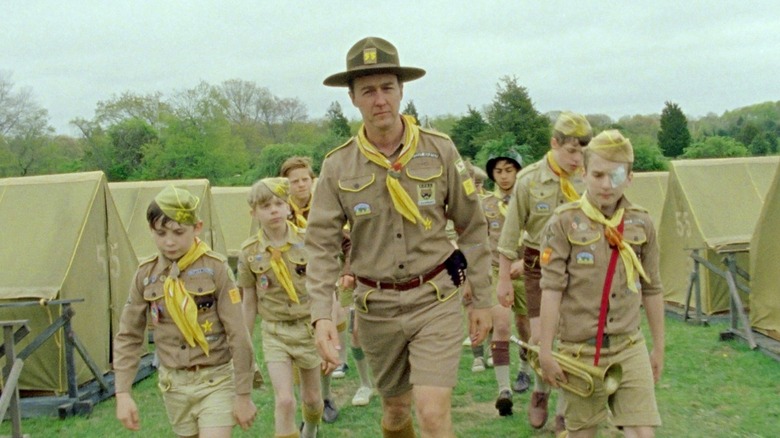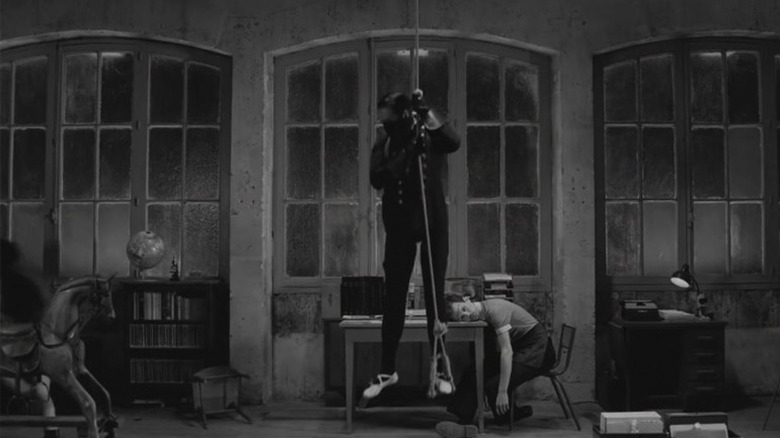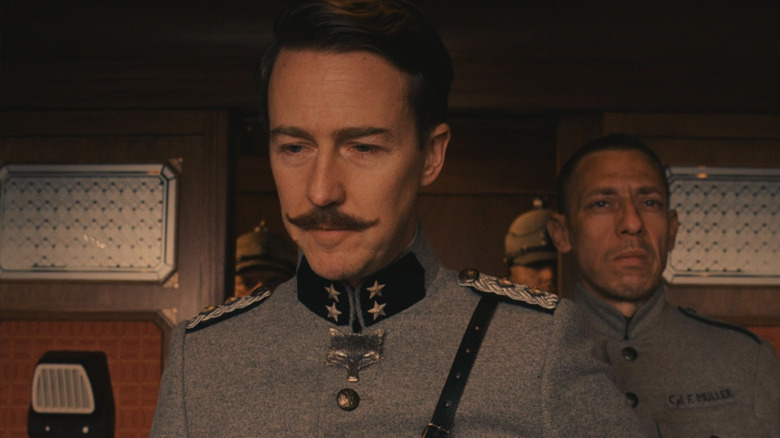The Connecting Thread That Keeps Edward Norton Coming Back To Wes Anderson Films
Wes Anderson is a director whose films all reflect his specific style. They feature the same unique shot compositions, thematic messaging, and a dose of whimsy. Some people criticize Anderson for this, saying he isn't capable of making a movie any different than all his others. But in a world where mainstream American movies are becoming more homogenous and visually uninteresting, it's refreshing to see a talented director who leaves his own personal signature on every one of his movies. Not every director needs to direct in the Marvel house style, and I'd rather see the vision of one person reflected over and over again than the vision of a conglomerate.
With such films as "The Royal Tenenbaums," "Moonrise Kingdom," and "The Grand Budapest Hotel" under his belt, all reflective of his unique directing style, one can't dispute the fact that Wes Anderson's style tends to produce fun, funny movies that are beautifully shot.
Edward Norton agrees with me. (What a sentence to write.) Norton, who has appeared in every single one of Anderson's films since his Anderson cinematic universe debut as Scout Master Ward in "Moonrise Kingdom," is clearly a huge fan of working with the filmmaker. But what is it about Anderson's movies that keeps Norton coming back? According to an interview with NPR in 2014, Norton loves the whimsy and messages about family.
Whimsy and pathos
Edward Norton spent his time honing his craft and performing in off-Broadway productions until he was discovered in 1995. It was then he was cast for the film "Primal Fear," based on the novel of the same name. His performance as an altar boy accused of murdering a Catholic archbishop received critical acclaim and set him on a rocket ship to stardom. He would go on to star in such films as "Fight Club," "American History X," and "The Incredible Hulk" (which he actually wrote the screenplay for), all before finally linking up with Wes Anderson for "Moonrise Kingdom."
Since he began working with Anderson, Norton has appeared in every one of the director's films, in small parts and large. Norton said in his NPR interview that it's the movies' combination of humor and emotion that always get him. "This sort of whimsy and the incredible humor and everything, but there's always these moments of, like, pathos that come in and sideswipe you," said Norton. "And every time I watch the 'Royal Tenenbaums' I'm laughing and laughing, and then for whatever reason, as soon as there's that scene where he releases the falcon or the hawk over the city and they play that Velvet Underground song, I tear up every single time I watch the movie at that point."
Finding family
It's not just a respect of Anderson's skill for filmmaking. Norton has a special appreciation for some of the common themes of Anderson's work, which include those of found family and self-discovery. "I've come to think that a lot of Wes's movies are about the same thing, which is maybe people struggling with the way that the family that you're born into fails you or you don't have the family that you sort of want. And so you go and create the family that you need, you know," said Norton. "So many of the characters in Wes's movies are essentially creating alternative communities that support them. And I think there's something really sweet in that idea."
Norton doesn't act as often as he did back in his heyday in the '90s, but he still comes out for projects he really believes in (he'll soon be seen in the ensemble cast of Rian Johnson's "Knives Out" sequel, "Glass Onion: A Knives Out Mystery"). And with such reverence for Wes Anderson's approach to filmmaking, it's only a matter of time until he pops up in the next Anderson movie — maybe as a snooty waiter, or an incompetent grade school teacher. If Anderson builds it, Norton will come.


